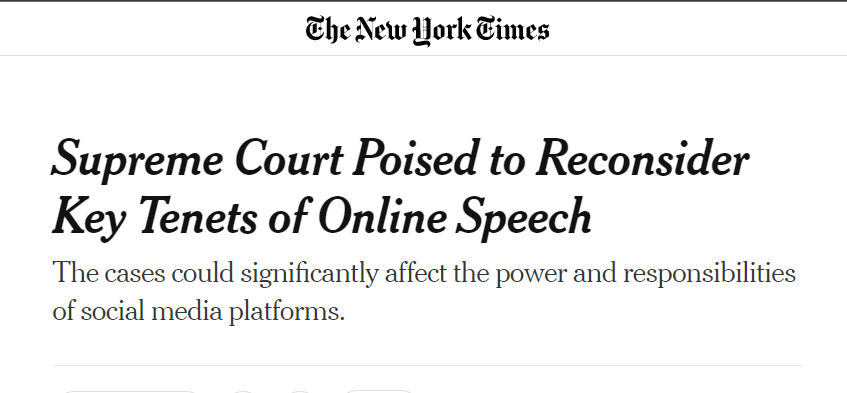Court Decision: Section 230 Does Not Shield EBay From Banned Chemical Listings

Table of Contents
Understanding the Court's Decision
The court case in question centered on claims against eBay for facilitating the sale of prohibited chemicals through its platform. Plaintiffs argued that eBay, despite having knowledge of the illegal listings, failed to adequately remove them, thereby contributing to harm. eBay, in its defense, invoked Section 230 of the Communications Decency Act, arguing that as an interactive computer service, it couldn't be held liable for content created by third-party users (the sellers).
The court, however, rejected eBay's Section 230 defense. The judge's reasoning hinged on the argument that eBay's actions went beyond merely hosting user-generated content. The court found that eBay's active involvement in facilitating the sales, including its profit-driven listing system and knowledge of the illegal activity, removed it from the protection offered by Section 230. This decision sets a critical legal precedent, potentially narrowing the scope of Section 230 immunity for online platforms.
- Plaintiff's Argument: eBay knowingly allowed the sale of dangerous, banned chemicals, directly contributing to harm and violating existing chemical regulations.
- eBay's Section 230 Defense: As a platform hosting user-generated content, eBay claimed immunity under Section 230, arguing it wasn't responsible for the actions of its sellers.
- Key Points from the Judge's Ruling: eBay's active participation in the sales process, its knowledge of illegal listings, and its profit motive negated Section 230 protection.
- Legal Precedent: The ruling establishes a higher standard of responsibility for online marketplaces, especially concerning the sale of regulated goods.
The Implications of Section 230 for Online Marketplaces
This decision reverberates far beyond eBay. Online marketplaces like Amazon, Etsy, and others now face increased scrutiny regarding their content moderation policies and legal strategies. The ruling suggests a potential weakening of Section 230's protection for platforms actively facilitating the sale of prohibited items.
- Increased Scrutiny: Online marketplaces will face greater pressure from regulators and potential lawsuits related to prohibited items sold on their platforms.
- Potential for Increased Legal Challenges: We can anticipate more legal challenges targeting online platforms over the sale of banned or regulated goods.
- Need for Enhanced Content Moderation: Platforms must invest in and improve their content moderation tools and processes to proactively identify and remove illegal listings.
- Impact on Seller Responsibility: This ruling may also shift more liability onto sellers, requiring stricter verification and accountability measures.
The Future of Online Chemical Sales and Regulation
The court's decision significantly impacts the online sale of regulated chemicals. This ruling will likely spur regulatory bodies to increase enforcement and collaboration with online marketplaces to ensure compliance with existing chemical regulations.
- Increased Pressure on Platforms: Platforms will face increased pressure to proactively remove illegal listings of chemicals and other regulated goods.
- Potential for Stricter Regulations: We might see stricter regulations imposed on online marketplaces regarding the sale of hazardous or controlled substances.
- Enhanced Verification Processes: Expect more robust seller verification processes, potentially including background checks and product authentication measures.
- Increased Collaboration: Greater collaboration between online platforms and regulatory bodies is likely to ensure compliance and prevent the online sale of dangerous materials.
Best Practices for Online Marketplaces After the Ruling
In light of this landmark decision, online marketplaces need to adopt proactive strategies to mitigate legal risks and comply with evolving regulations. This involves improving content moderation, enhancing seller verification, and strengthening legal compliance procedures.
- Invest in Advanced AI-Powered Detection Systems: Implement AI to automatically identify and flag potentially illegal listings, improving efficiency and accuracy.
- Strengthen Verification Processes for Sellers: Require more thorough background checks, business licenses, and product verification for sellers of regulated goods.
- Develop Clear and Comprehensive Terms of Service: Create unambiguous terms of service clearly outlining prohibited items and seller responsibilities.
- Implement Robust Complaint and Reporting Mechanisms: Enable easy and efficient reporting of suspicious listings by buyers and users.
- Proactive Monitoring and Removal of Suspicious Listings: Regularly monitor listings and proactively remove any that violate terms of service or relevant regulations.
Conclusion
This court decision concerning Section 230 and the sale of banned chemicals on eBay highlights the evolving legal landscape for online marketplaces. The ruling underscores the critical need for proactive content moderation strategies and emphasizes that merely hosting user-generated content doesn't absolve platforms from responsibility, especially when actively facilitating the sale of regulated goods. The implications extend far beyond eBay, affecting all online platforms selling controlled or regulated products. Understanding this ruling's implications is vital for all online marketplaces. Stay informed about updates and changes to legal requirements related to Section 230 and the sale of banned chemicals online.

Featured Posts
-
 Ufc 315 Results Full Muhammad Vs Della Maddalena Main Card Breakdown
May 12, 2025
Ufc 315 Results Full Muhammad Vs Della Maddalena Main Card Breakdown
May 12, 2025 -
 2025 Resi Awards Meet The Industry Leaders
May 12, 2025
2025 Resi Awards Meet The Industry Leaders
May 12, 2025 -
 Analysis The Impact Of Heightened Border Security On Arrest Numbers And Rejected Entries
May 12, 2025
Analysis The Impact Of Heightened Border Security On Arrest Numbers And Rejected Entries
May 12, 2025 -
 Summers First Blow Hailstorms Ravage Pools And Green Grass
May 12, 2025
Summers First Blow Hailstorms Ravage Pools And Green Grass
May 12, 2025 -
 Trumps Alcatraz Reopening Plan The Enduring Mystery Of The Famous Escape
May 12, 2025
Trumps Alcatraz Reopening Plan The Enduring Mystery Of The Famous Escape
May 12, 2025
